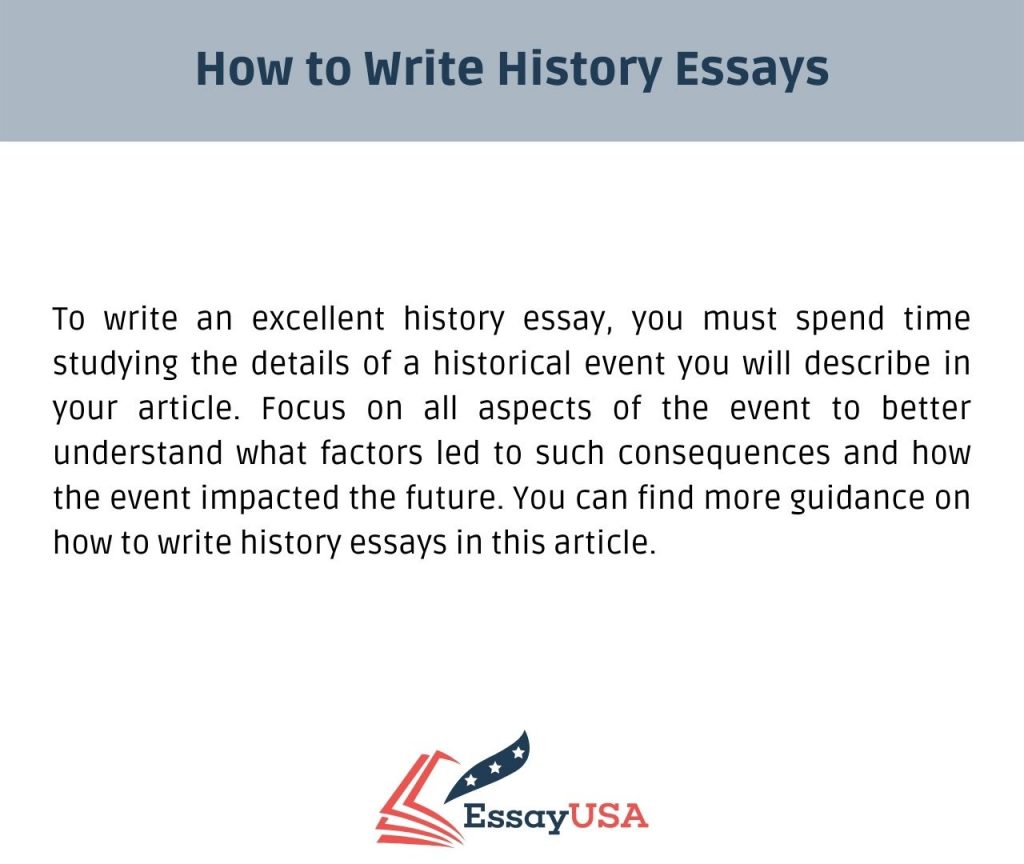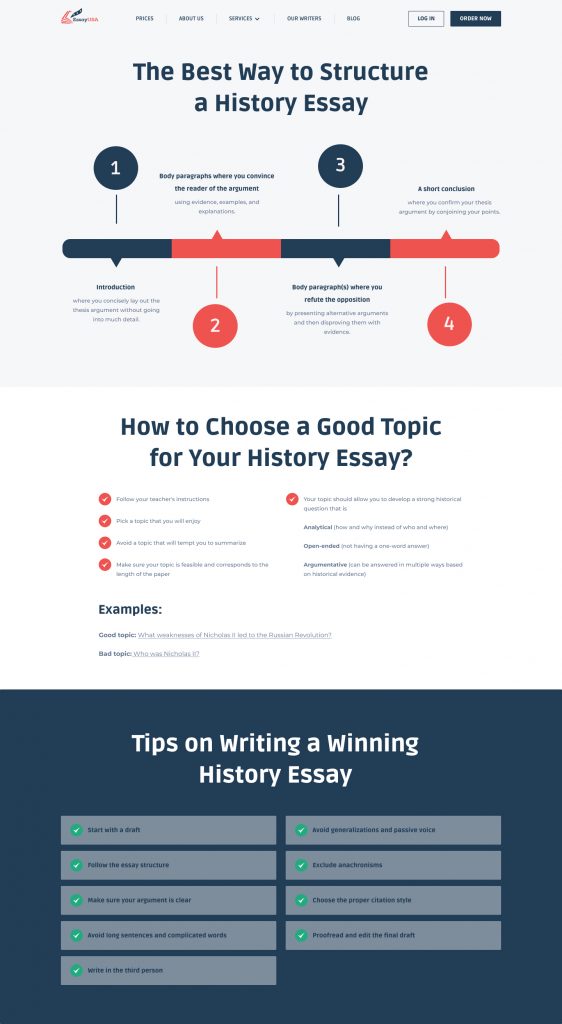
How To Write A History Essay
Every history student writes essays on different subjects. These papers help students master the art of academic writing and prepare them for future writing assignments in the workplace. Moreover, such an assignment evaluates how well a student has understood a specific topic or concept.
But how can you master this art and produce excellent essays in the future? This post examines all the details of composing this assignment from start to finish. We dwell on the structure, topic selection, and writing tips to equip you with the full arsenal of writing prompts. Besides, you can find several illustrative examples that may inspire your writing efforts. Remain on this page to improve your writing game in this discipline.
What is a History Essay?
To elaborate an impeccable history paper, it is crucial to answer the ‘what is history essay’ question. The history essay’s essence lies in the successful introduction and confirmation of statements related to some historical events or personalities. To make your work sound professional, you need to:
- elucidate the factors that have led to such consequences;
- build a logical bridge between the past and the present by describing the importance of the phenomenon you are dealing with.
A top-notch history paper never focuses on the past mainly. It rather comes up with the impact the past events have on the present. An ability to fully reveal the given influence is the most significant proof that the author has a good understanding of the topic and can easily share their perspective professionally and to the point.
Having the instructions and practical tips on how to write a history essay is the first key to a successful paper. Many students just start rewriting the historical events in their own words at this stage. Instead, your essay should provide clear answers to three central questions: what, why, and how. These questions may become good starting points for your history essay and help you stay coherent.
Before You Start: Preparing to Write

Having three questions in mind when preparing to write a history essay is already half a work done. Carry out a little brainstorm session and formulate several sub-questions using the mentioned interrogative adverbs. They will contribute much to the creation of an effective structure in your history essay. Here’s a breakdown of the main questions addressed.
Who
- Who are the main characters of the given events?
- Who is against the given events?
- Who won from the given events? Who lost?
- Who is currently in the winning position thanks to the mentioned events?
What
- What circumstances caused the given events?
- What changes did the given events cause?
- What kind of effect did the events have on the present?
- What conclusions have been made after these events?
Why
- Why did the given events take place?
- Why were they supported/not supported by people?
You may also come up with your suggestions regarding the specific topic to make your essay even more professional.
Nonetheless, it is not enough only to write down the questions. You have to analyze and evaluate them profoundly. You may be very accurate about the described shreds of evidence, proofs, and arguments. However, if your essay doesn’t provide precise answers to the fundamental questions, it is unlikely to be highly scored. To stay coherent and to the point, use an explanation/interpretation scheme that implies the reasons why something has happened, followed by the profound analysis of the events.
When the above-mentioned work is done and questions have been answered, you are ready to form your paper’s thesis statement. If we talk about the history essay, its thesis statement should be strong enough to prove the significance and value of your work. Besides, convincing arguments help create a solid bone to structure your essay around.
Your paper’s thesis statement should accurately elucidate the essay’s essence and be supported with the concise arguments that would become its paragraphs. All you need to do is specify them and then elaborate in more detail.
You can change the arguments throughout the essay, but the thesis statement should remain the same and be rational enough to stay relevant till the end.
Research Stage
Nominally, the sources you will be using for your history essay can be divided into primary and secondary ones. Primary sources refer directly to the description of the events or personalities you base your paper on. Secondary sources represent the works of experienced historians, sociologists, and politicians that contain the profound analysis of the events described within your topic.
The professional history essay cannot exist without trustful primary sources. It can be challenging to find and identify them. Fortunately, the XXIst century provides a decent range of opportunities to complete thorough research work. You can have access to the best scholars’ papers, databases of the world libraries, and blogs of famous experts. Crowd-sourced websites can also be of good service. However, they should be used very selectively after you make sure they are credible.
Secondary sources are as important as the primary ones. You need to be sure of their credibility and choose exclusively scholarly works. Check whether the author of the paper you are going to use in your essay is a professional historian and can be trusted. To make the right choice, ask yourself several questions before referring to any source:
- What do you know about the author?
- Does the author have an academic degree and enough experience to be trusted?
- What can you say about the publishing house? Is it academic? If it is a website, check its nature and audience. The idea to use materials published on Government online platforms in your paper sounds just perfect.
History Essay Outline

Coming to the outline stage means that you have done all the preparatory work and are ready to move forward. The outline is frequently skipped by students, which makes them regret it later. The outline is a so-called roadmap to indicate the direction you need to move in and mark the proper placing of arguments and ideas.
Like all other types of essays, a history paper consists of an introduction, body paragraphs, and conclusion.
Introduction
Are you wondering how to start a history essay? With the catching introduction, of course. Introduction to your history essay should serve as a so-called hook to immediately grab the readers’ attention. To make it as catching as possible, you may use a few simple yet trusting methods:
- Include some facts or impressive statistics. This will help easily win people’s trust and make your paper more relevant;
- Rhetorical questions always help define the sense of your creative work. Use them in the introduction to indicate the main points your work will be based on;
- Quotations may also be of good service in case you want to make people intrigued.
Provided the hook has worked, don’t hesitate to introduce your paper’s theme: mention the key events or persons your essay is about. Usually, a good introduction ends with a strong thesis statement. Make it short and up to the point. Besides, make sure it provides a smooth transition to the body section of your history essay.
Essay Body
Divide your critical ideas described in the essay and between the paragraphs: one paragraph = one idea. Each idea needs to be supported by concise arguments. There is no standard scheme to build your body paragraphs on. However, you may take the following algorithm for the basis:
- A sentence related to the thesis statement and elucidating the idea;
- Context of your history essay;
- Facts in the form of quotation or rewritten
- Analysis and your point of view
- Facts in the form of quotation or rewritten
- Analysis and your point of view
- Description of the controversial points
- Smooth transition to the next paragraph
It is highly recommended to place the arguments of your body section in correct order. Start with the weakest ones and leave the strongest ones for a dessert.
Conclusion
You should put your best effort into making this paragraph as impressive and convincing as possible. The final part of your paper should focus on the main points of the essay and again prove the theory mentioned in the thesis statement. Don’t make the conclusion too complicated – it needs to be simple and straightforward. The conclusion is not a part of the paper where you may introduce some new facts and ideas. Its main goal is in summarizing the critical points previously specified in the essay. If you want to make a conclusion sound professional, don’t forget to mention the historical events’ relevance to today’s reality.
How to Choose a Topic for a History Essay?
Choosing a topic is an important stage in history writing, as it helps you narrow down the scope of the assignment properly. If you write about some historical persona, you can frame your paper like a biography essay. You may also deal with the analysis of historical events, epochs, and cause-and-effect dynamics of historical processes.
Here are the main aspects you should take into account when choosing a topic.
- Consider your likes and interests. History is wide, and you may not be interested in every aspect. In this case, it would be unwise to choose a topic from an area you have no clue about. By following your interests, you will have an easy time researching and writing about the topic.
- Check out the resources. You also have to consider if there are enough materials to research your preferred topic. Proceed with your choice only if there is sufficient evidence you may rely on.
- Consider your paper’s scope. A broad scope can make it difficult to present an in-depth analysis of the chosen topic. For instance, writing a 1,000-word essay on African history is too wide. Therefore, you need to balance breadth and depth to make an essay truly interesting.
Here are a couple of essay topic suggestions that may guide you in the writing process.
- The causes behind the fall of the Roman Republic.
- What role did women play in the ancient Egyptian society?
- What traces of ancient Greek philosophy are felt in modern politics?
- What strategy did the Persian Empire use in its expansionist efforts?
- What were the social consequences of the Black Death for Europe?
- How did Alexander the Great’s legacy affect the Hellenistic world of his times?
- What were the real motivations behind the Crusades?
- How did the Catholic church shape medieval politics in Europe?
- What was the impact of the Protestant Reformation on Europe?
- How did the Industrial Revolution affect people?
- What are the far-reaching repercussions of the Scramble for Africa?
- Are the Opium Wars really over?
History Essay Examples to Learn From
Nothing works better than a perfect example of a well-done job. Below are sample history essays to jump-start your inspiration.
Example #1 What Were the Causes and Effects of the Battle of Jerusalem 1917?
The Battle of Jerusalem in 1917 was a critical occurrence in WW I. Its strategic location and importance attracted the British commanders. Therefore, linking the success of the war for the Allies with the capturing of the city, Britain created a path for capturing it. The entire military campaign complicated the background with failures and triumphs and caused negative ramifications for the Turks.
Although World War I registered some success, 1917 was not very significant for the British. The British lost many soldiers without thousands of others being wounded. Moreover, their food stocks were depleted. It is no wonder that David Lloyd George, Premier, tried solving problems and finding ways to end the war with victories for the British army.
Example #2 America’s Legacy to Millennials
The USA has a rich history and a vibrant tradition that embraces innovation and prosperity. As a millennial, I have the privilege of growing up in this great nation. It has pioneered many social movements and technological advancements that have endowed the millennials with many opportunities to improve our lives for generations.
Correctly nicknamed the “land of opportunity,” the United States has offered millennials and other generations coveted opportunities to study and grow. It has invested in a vibrant education system that offers learners high-quality education at various levels. No wonder it spends more on education than any other country on earth. Consequently, it has a vibrant and educated labor force, and millennials can pursue higher education to hone their professional skills to compete locally and internationally.
Writing Tips for a History Essay
Interpretation of the past may be pretty controversial. So are the rules on how to write a perfect history essay. Nevertheless, there are some standard conventions and guidelines for elaborating professional history papers without any special effort from your side. Just follow the below tips to get the highest grade under the toughest history essay rubric.
Use the past tense
The present tense is just inappropriate when dealing with the history essay. Moreover, it can undermine confidence in the qualifications and expertise of the author. The present tense is acceptable only when you draw parallels between past events and the current time.
Avoid generalizations
Specificity and accuracy are the best friends of a highly professional history essay. If you talk about some specific period, introduce exact dates or centuries. In case you mention some personalities, provide their full names. History paper is senseless without these critical details.
Exclude anachronisms
When dealing with some historical events from today’s perspective, it is easy to get lost in chronological order. Such a jumble can confuse the readers and make your work less credible. Mind the vocabulary you use when talking about a specific epoch.
Try not to judge the epoch from a modern perspective
Every generation has its advantages and drawbacks. Your main task as an author is to analyze both and convey them clearly to a reader. Don’t be judgmental.
Paraphrasing is always better than quoting
Stuffing your history essay with the quotes can be more of a hindrance than help. Don’t be afraid to showcase your analytical skills and dive deep into the profound analysis of past events. If paraphrasing is impossible, use the quote indicating its source.
Be responsible for the context
As an author, you assume full responsibility for your personal opinion and ideas. At the same time, you should be sure of the sources you use in your paper. History essays don’t stand uncertainty and double standards.
Choose the proper citation style
As a rule, history papers require Chicago citation style. A poorly arranged citation page can question your reputation as a history expert.
Stick to the proper voice
A formal academic voice is the most appropriate one when we talk about the history essay. Also, avoid passive voice phrases, redundant constructions, and generalizations.
Take care of thorough proofreading
You have made it: your history essay is ready and waits to be polished. The editing stage is crucial as even the brightest ideas can get lost in a sea of mistakes, impurities, and vague phrases. How to proofread your history essay to make it shine? Check the below instructions to learn how to do it:
- Read your history essay aloud several times to make sure it is clear and sounds smooth. Avoid long sentences and inaccurate phrases with unclear meaning.
- Proper style is important when we talk about the academic history essay. Make sure it is formal but readable. Readers should easily percept your message and clearly understand the goal of your research.
- Proofreading may be challenging in case you have spent a lot of time elaborating on the content. If you can ask someone to look at your history paper with a fresh pair of eyes, it would be perfect. Independent readers can identify the weak places in your work faster, and you will get a valuable second opinion on your piece of writing.
Write My History Essay for Me, Please!
Writing about history is both exciting and demanding. Therefore, you will have to research the assigned subject thoroughly and collect as much data about it as you can to present a well-informed argument and narrative. Don’t be afraid of this task; with a step-by-step guide and an interesting topic, you are sure to nail the assignment faster. If you need further assistance on our part, don’t hesitate to visit our website and place an order for a history assignment. Our authors are always ready to craft exciting, thought-provoking papers for clients using credible scholarly evidence and resources.





